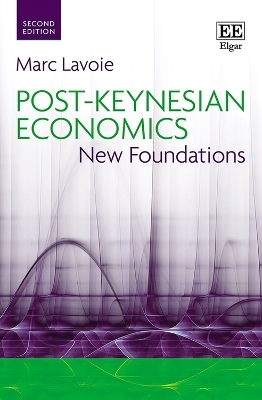
Economic Growth and Structural Reforms in Europe
Cambridge University Press (Verlag)
978-1-108-47911-0 (ISBN)
In contrast to the USA, Europe has struggled to return to the growth path it was on prior to the financial crisis of 2007–11. Not only has the recovery been slow, it has also been variable with Europe's core countries recovering more quickly than those on the periphery. It is widely believed that the best way to address this slow recovery is through structural reform programmes whereby changes in government policy, regulatory frameworks, investment incentives and labour markets are used to encourage more efficient markets and higher economic growth. This book is the first to provide a critical assessment of these reforms, with a new theoretical framework, new data and new empirical methodologies. It includes several case studies of countries such as Greece, Portugal and France that introduced significant reforms, revealing that such programmes have very divergent, and not always positive, effects on economic growth, employment and income inequality.
Nauro F. Campos is Professor of Economics at University College London and Research Professor at ETH-Zürich. His main fields of interest are political economy and European integration. He has taught at the Universities of Bonn, Brunel, CERGE-EI (Prague), Newcastle, Paris 1 Sorbonne and Warwick. He was a Fulbright Fellow at Johns Hopkins University, a Robert McNamara Fellow at The World Bank, and a CBS Fellow at the University of Oxford. He is a Research Fellow at IZA-Bonn, a member of the Scientific Advisory Board of the (Central) Bank of Finland, a Senior Fellow of the ESRC Peer Review College and was a visiting scholar at the IMF, World Bank, European Commission, University of Michigan, ETH, USC, Bonn, UCL and Stockholm. Paul De Grauwe is Professor of Economics at the London School of Economics and Political Science. He was a member of the Belgian parliament from 1991 to 2003. He is honorary doctor of the Universität St Gallen, Switzerland, the University of Turku, Finland, Università degli Studi di Genova, Universitat de València, and Universiteit Maastricht, Netherlands. He has taught at the universities of Paris, Amsterdam, Berlin, Kiel, Milan, Pennsylvania and Michigan. He is a research fellow at the Centre for European Policy Studies in Brussels and CEPR fellow in London. His research interests are in the economics of monetary unions and behavioural macroeconomics. He is the author of The Limits of the Market (2017), The Economics of Monetary Union, 11th Edition (2016) and Lectures on Behavioral Macroeconomics (2012). Yuemei Ji is Associate Professor of Economics at University College London. She was a visiting fellow at the European Institute at LSE and the Centre for European Policy Studies (CEPS) in Brussels. She gives lectures on European Macroeconomics and International Macroeconomics. Her research interests cover international macroeconomics in general and the European Monetary Union during the post-crisis period in particular, and she has done intensive research on the causes of Eurozone debt crisis and its impact on the austerity policies in the Eurozone.
Introduction; Part I. Economic Growth and Structural Reforms in Europe: 1. Euro area growth and European institutional reforms Mariarosaria Comunale and Francesco Paolo Mongelli; 2. Structural reforms and growth: the elusive quest for the silver bullet Alessio Terzi and Pasquale Marco Marrazzo; 3. Regulation, institutions and economic growth in advanced, emerging and developing countries Balázs Égert; Part II. Macroeconomic Implications of Reforms: 4. Heterogeneous market regulation and divergence in a currency union Mirko Abbritti and Sebastian Weber; 5. Macroeconomic imbalances in the euro erea: can they be managed? Michael Hume; 6. Financial crises and liberalization: progress or reversals? Orkun Saka, Nauro F. Campos, Paul De Grauwe, Yuemei Ji and Angelo Martelli; 7. Structural reforms and fiscal sustanability Davide Furceri and João Tovar Jallas; 8. Transitions in the EU labour market before and after the crisis: the role of reforms Corrado Macchiarelli, Vassilis Monastiriotis and Nikolitsa Lampropoulou; 9. On the complementarity between labour market regulation and tax reforms in the European Union Angelo Martelli, Nauro F. Campos, Michael Ganslmeier, Yuemei Ji and Orkun Saka; Part III. Case Studies: 10. Structural reforms in Europe: lessons from early experiences Orkun Saka, Nauro F. Campos, Paul De Grauwe, Michael Ganslmeier, Yuemei Ji and Angelo Martelli; 11. Fiscal consolidation and inequality: the distributive effects of fiscal reforms in Greece and Portugal Fabian Mushövel; 12. How openness to trade rescued the Irish economy Kieran McQuinn and Petros Varthalitis; 13. Goulash labour market structural reforms: Hungary, 1986–2016 Nauro F. Campos; Conclusions.
| Erscheinungsdatum | 02.04.2020 |
|---|---|
| Zusatzinfo | Worked examples or Exercises; ? Tables, black and white; ? Halftones, black and white; ? Line drawings, black and white |
| Verlagsort | Cambridge |
| Sprache | englisch |
| Maße | 158 x 235 mm |
| Gewicht | 750 g |
| Themenwelt | Wirtschaft ► Volkswirtschaftslehre ► Finanzwissenschaft |
| Wirtschaft ► Volkswirtschaftslehre ► Makroökonomie | |
| ISBN-10 | 1-108-47911-1 / 1108479111 |
| ISBN-13 | 978-1-108-47911-0 / 9781108479110 |
| Zustand | Neuware |
| Haben Sie eine Frage zum Produkt? |
aus dem Bereich


